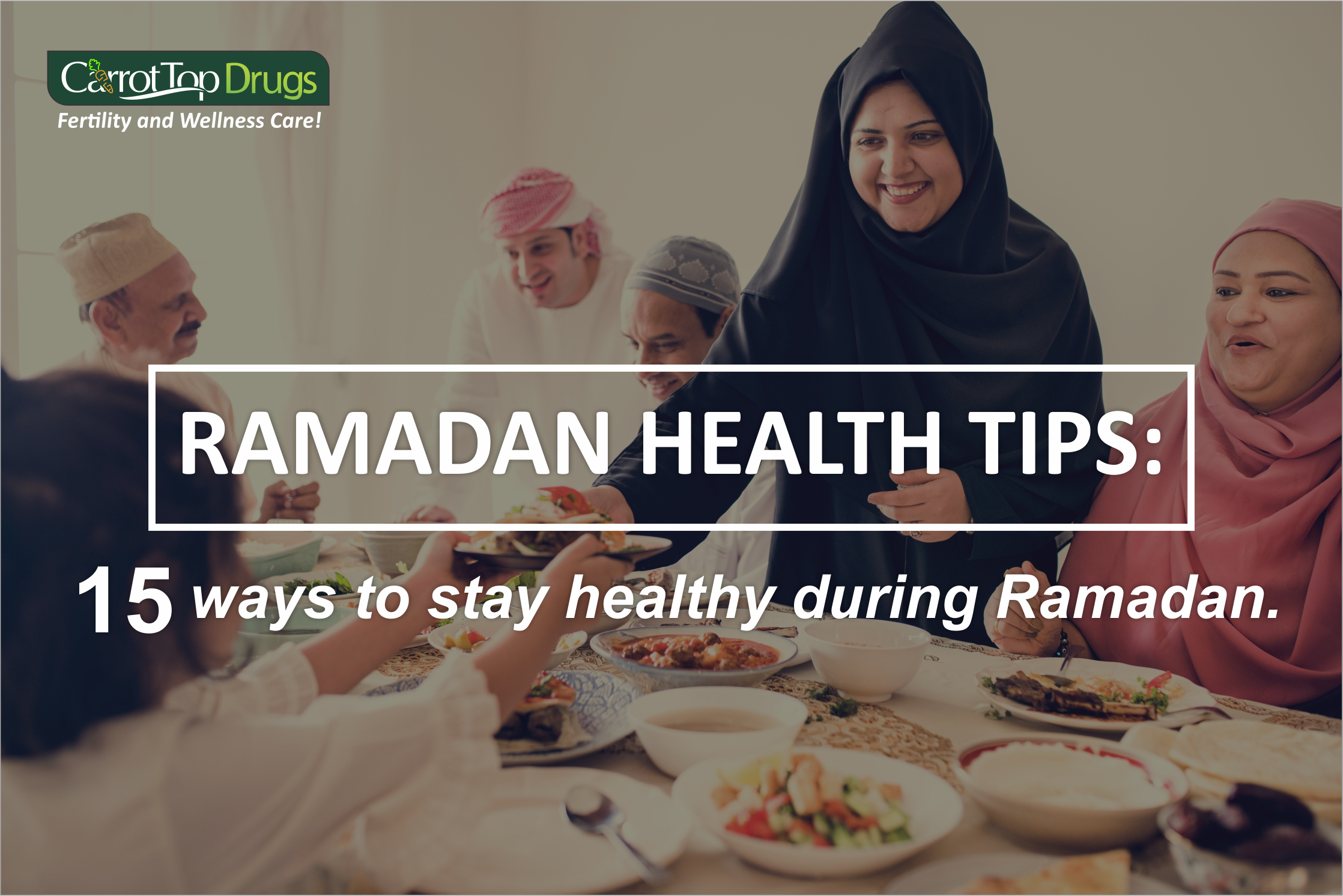The word “Ramadan” was formed from Arabic word, ramiḍa or ar-ramaḍ, which means scorching heat or dryness. It is the ninth month of the Muslim calendar, during which strict fasting is observed from dawn to sunset. Fasting during the holy month is one of the five pillars of Islam, which also include prayer and charity. During this fast, Muslims abstain from eating, drinking, smoking and engaging in sexual activity from dawn to sunset. Muslims use the lunar calendar, which means Ramadan arrives several days earlier each year. For longer lasting energy this year, it is important to pay attention to the quality of the food you eat while breaking your daily fasts. This is essential to prevents hunger, tissue breakdown and for better endurance ability during the long day. Remember, A well-balanced diet is key to healthy fasting during Ramadan. Here’s some health tips for you.
#1 NEVER SKIP “SUHOOR”: Just as breakfast is the most important meal of the day, ‘Suhoor’ (the meal eaten before dawn) is very important during Ramadan. It helps your body stay hydrated and nourished until your next meal at iftar.
#2 DON’T OVEREAT AT THE SUHOOR MEAL: Avoid overeating when you break your fast before dawn. Overeating may result in indigestion and weight gain. A well-balanced meal at ‘suhoor’ should contain all major elements of a balanced diet.
#3 REDUCE SALT INTAKE: you should limit your intake of salt or salty foods, especially during Suhoor (pre-dawn meal), as this increases thirst.
#4 AVOID CAFFEINATED DRINKS: Caffeine is a diuretic that can make you loose water faster, leading to dehydration through urination. It is better to avoid caffeinated drinks such as strong tea, coffee and colas, or drink them in moderation.
#5 DON’T OVEREAT DURING IFTAR (DINNER): While it is tempting to overindulge at Iftar after a day of food deprivation, remember, just like for Suhoor, you should not overindulge.
#6 TAKE PLENTY OF FLUIDS: Try to consume fluid-rich foods, including fruit, vegetables and yogurt. Liquids (water, juice, soup, stew) also help maintain the fluid and electrolyte balance in the body. It helps replenish whatever was lost during the day and to start the next day of fasting well hydrated.
#7 EAT FRUITS AND VEGETABLES EVERY DAY: Some fruits and vegetables naturally contain high water content, especially cucumbers and watermelons Fiber-rich fruits such as: bananas, oranges, apples, mangoes and berries are especially important during Ramadan fast.
#8 AVOID HIGH SUGAR FOODS: It is not uncommon for people to reward themselves with greasy, fried and sugary dishes after fasting. High-sugar foods usually provide energy for only a short time. Although these foods make you feel good in the short run, they can make fasting the next day more difficult.
#9 AVOID JUNKS AND PROCESSED FOODS: When fasting, Junk foods like chips, instant noodles, fried foods and other less nutritious foods do not add anything to your nutritional needs because they don’t contain many nutritional values. But, if you eat nutrient-rich foods, you will feel fuller, and won’t have to take large portions during iftar and suhoor.
#10 AVOID EATING TOO MUCH FRIEND FOODS: Aside from the unhealthy weight gain, consuming fatty foods can also cause sluggishness and fatigue. You wouldn’t really want that for your next fasting day.
#11 EAT SLOWLY: You should eat slowly and give time for your body to digest the food. At iftar, you can start with a few dates and water and then wait before starting your main meal. Dates are a great source of energy for the body.
#12 MAKE SOUPS A REGULAR ITEM ON YOUR IFTAR MEALS: Soups are warm, soothing on the stomach and easy to make. They provide our body with fluids, vitamins and minerals. They also allow you to incorporate vegetables. This will make you feel full for a longer period.
#13 AVOID WORKING OUT DURING FASTING HOURS: If you do regular workouts, it’s advisable to postpone working out until after fasting hours to avoid dehydration. Wait for at least least 2-3 hours after eating before you begin your exercise routine. This will allow your food digest properly. Also, take plenty water throughout your workout to replenish the water and mineral losses due to sweating. Water regulates your body temperature, lubricates your joints and transports nutrients throughout your body.
#14 REVIEW YOUR MEDICATIONS: If you’re on any medication(s), you can consult your doctor for advice on how to take your meds during the fasting. If you are a TTC (trying to conceive) couple currently taking fertility boosters like Evergreen Formular for Men and Women, you can adjust it to 1 capsule in the morning and 2 capsules in the evening instead of the regular one capsules 3 times daily.
#15 DON’T GO TO BED IMMEDIATELY AFTER SUHOOR: Going to bed after a big suhoor meal may cause digestive problems because your body would have to work harder to digest food when it’s in the resting mode. It may even trigger symptoms of ulcer problems due to excessive stomach acid. So, it’s advisable to stay up a while longer before going to bed.
Make sure you SHARE this with all your Muslim friends. For enquiries, Call or WatsApp – 07054644000. RAMADAN MUBARAK!
From: Carrot-Top Drugs Limited – Helping Couples Become Happy Parents!

















